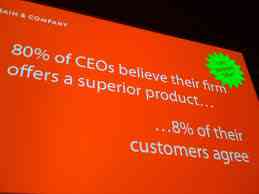The Wobegon Effect
One of the painful things about our time is that those who feel certainty are stupid, and those with any imagination and understanding are filled with doubt and indecision.
– Bertrand Russell
Skiing this past weekend, I thought I might learn something by watching myself ski. I stopped in the middle of the trail and asked my friend to take a short video of myself. Ack. It was helpful, but painful to watch. There’s a reason we don’t like to listen to our own voice recorded, or watch video of ourselves. We’re much better in our minds.
It’s an odd thing that the more inept we are at something, the better we think we are. And inversely the better we are, the more likely we are to undervalue our skills.
- In a study of self-assessment in classrooms, students performing in the bottom 25% described themselves as performing above the 60th percentile
- 87% of MBA students at Stanford University rated their academic performance as above the median
- In 1976, the College Board did a survey and discovered in ratings of leadership ability, 70% of the students put themselves above the median
- The same study asked participants to rate themselves in their ability to get along with others, an indication of their emotional fluency – 85% put themselves above the median, and 25% of students rated themselves in the top 1%
- A 1981 study of american drivers found that 93% rated themselves among the top half of skilled drivers on the road.
All statistical impossibilities. Another unfortunate truth is that the less competent we are at problem solving, gaining particular skills, or storing knowledge, the more we overestimate our abilities. Some researchers think it’s because we don’t know what we don’t know.
I had an interview with Rick Warren, pastor of Saddleback Church, one of the largest in the country, who emphasized the value of humility in developing oneself. As he described, the key is not to think of humility as a self-deprecating exercise. Humility is not another way to say, “I suck.” It’s a way to identify, with honesty, those beliefs and behaviors which are inhibiting our own growth and those around us. As he described, start with an honest sense of humility, and a willingness to ask hard questions:
Often we are so afraid of appearing like we don’t know it all, we end up not knowing it all. I’d rather admit I don’t know it and learn it than to pretend that I know it all… Asking questions is a mark of humility because you can learn from anybody if you know the right questions.
– Rick Warren



